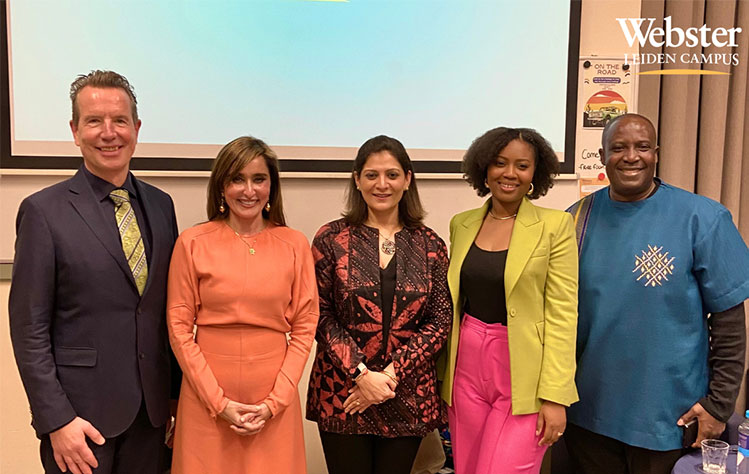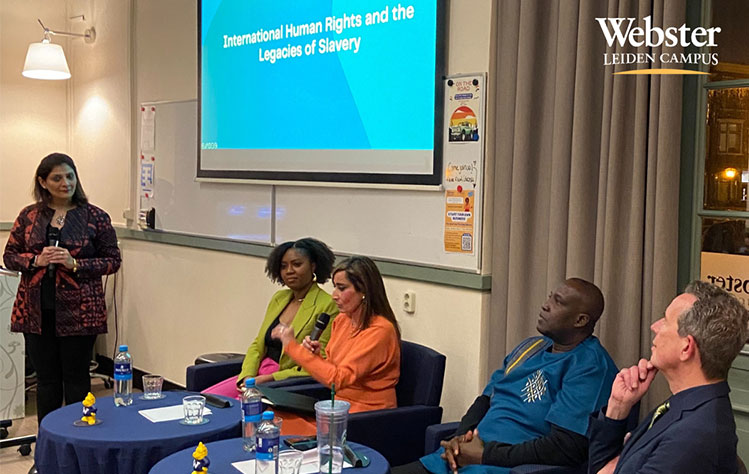Webster Leiden: Reflecting on International Human Rights and the Legacies of Slavery
March 28, 2024

From left to right: Jean Paul van Marissing, H. E. Shefali Razdan Duggal, Sheetal Shah, Consuela Esseboom, and Yaw Pare, who served as panelist speakers at the event.
The issues of human rights and slavery are so closely intertwined that one cannot be discussed without the other. The Webster Leiden Campus recently hosted a seminar overviewing both of these topics, titled “International Human Rights and the Legacies of Slavery.” The event featured Keynote Speaker H. E. Shefali Razdan Duggal, U.S. Ambassador to the Netherlands; and guest speakers Yaw Pare, photographer and filmmaker; and Consuela Esseboom, a psychologist and Webster Leiden alumna.
In her keynote address, Duggal provided a diplomatic perspective on international human rights while highlighting the significance of collective action in upholding human rights standards. The ambassador also emphasized the interconnectedness of nations in upholding the fundamental principles of equality, justice and human rights. Her insights illuminated the responsibility of all nations to protect and promote human rights.
Pare, a prominent photographer and filmmaker from Ghana, captivated the audience with poignant images from his recent book, “Remnants of a Haunted Past. Forts and Castles of Ghana.” This visual element transported the audience into the heart of human rights struggles and the resilience of Ghanian communities affected by human rights violations, adding emotional depth to the discussions. Pare highlighted the significance of cooperation and partnerships between countries to honor those affected in the era of slavery.
Esseboom, in contrast, offered invaluable insights into the psychological impact of systematic injustices. Her exploration of the emotional toll on individuals and communities affected by generations of enslavement underscored the need for holistic approaches to address human rights challenges. She further encouraged the audience to confront uncomfortable truths through practicing honesty and respect in their homes.
“We must always make the intentional effort to remember that there are real people behind the history, stories, and pleadings for equity. Although conversations around such topics are often highly radicalized and politicized, they are not actually matters of politics but of humanity,” Esseboom shared. “And most importantly: we must not allow ourselves to be distracted from viewing all opinions, education and calls to action through a lens of context and empathy, as we collectively find our way forward.”

Panel speakers sit at the front of the room during the event.
The panel went on to discuss various perspectives concerning the legacies of slavery and their present-day connections with contemporary human rights issues such as human trafficking, sexual exploitation, forced marriage, child labor, and the use of children in armed conflicts.
“To this day, the repercussions of slavery are evident not only on the surface level, but also deeply in societies and family dynamics,” said Noura Ouattara, an event attendee. “In order to even begin to address the issues we face, especially those pertaining to human rights, it is important to adopt an interdisciplinary approach. And this is really why this panel discussion was so important.”
“Respecting international human rights is not only a responsibility for governments and businesses,” added Jean Paul van Marissing, Webster Leiden’s campus director. “As an individual you can choose to play an active role in promoting respect for international human rights, for example, as a consumer, a scholar or an artist.”
Sheetal Shah, academic director of the Webster Leiden Campus and moderator of the seminar, closed the panel discussion with a question she has faced for two decades during her work to combat modern-day slavery and human trafficking.
“Research shows that there are more slaves today than at any point in time in history! The question is — what are we going to do about it? I don’t know whether this will change in my lifetime, but I know we have started asking the right questions and are questioning our own slavery footprint based on our consumption patterns. I sincerely hope in the lifetime of the students, our future leaders and policy makers, we will see this change!”
